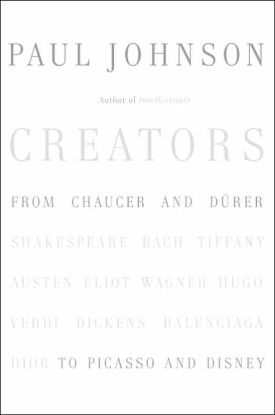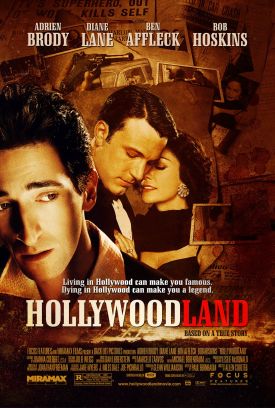Absent at the Creation
From The American ConservativeThe Creators: From Chaucer and Dürer to Picasso and Disney
By Paul Johnson
HarperCollins, 320 pp., $25.95
They say that The Economist is an excellent magazine for keeping informed about subjects you don’t know anything about, but its deficiencies begin to appear as soon as it addresses one you do. The same could be said about Creators by the British polymath, Paul Johnson, whose previous books, including Modern Times and The Birth of the Modern, have also tended to take on the kind of very large subjects of which one man could hardly be expected to have deep as well as extensive knowledge. But those books had a compelling narrative line and a brilliance that was at worst idiosyncratic. The arts seem to bring out the crank in him. Creators, a collection of sketches and mini-biographies like Intellectuals, to which it is the second in a projected trilogy to be concluded with Heroes, is an even odder book. It lumps together not only Picasso and Disney but Bach and Balenciaga, Shakespeare and Louis Comfort Tiffany, all of whom share only the name of “Creators.” Well, yes, but is that quite enough for them to have in common in order to make a subject for a book? I’m not persuaded, though I freely admit to having learned from the book a lot that I didn’t know about a number of fascinating people.
But what about the things I did know? There aren’t that many of them, alas, but where Mr Johnson touches upon them I notice that he sometimes goes seriously astray. Here, for instance, is what he says about Geoffrey Chaucer’s story-telling manner:
Chaucer, like all great tale-tellers, aims at deliberate speed; and as with other brilliant comedians who came later — one thinks of Shakespeare himself, Swift, and Waugh — uses enviable economy of means in his funny bits, the couplet of short sharp words being perfect for his purpose. He never uses two words where one will do, and The Miller’s Tale, a virtuoso exercise in brevity and keeping to the point, shows him at his best.
This is flat wrong, as anyone with more than a superficial knowledge of Chaucer could have told him. The Chaucerian style is just the opposite of this economical one, whether or not (and this is debatable too) Shakespeare, Swift and Waugh use it. His comic effects are often achieved by using not just two words where one will do but 20. Since Paul Johnson brings up The Miller’s Tale, we might consider Absolon’s shocked reaction to the discovery that he has unwittingly been kissing Alison’s naked ers —
Who rubbeth now, who froteth now his lippes
With dust, with sond, with straw, with clooth, with chippes —
where rubbeth and froteth mean the same thing and the comedy builds with each new abrasive. Or consider these lines from Troilus and Criseyde where old Calkas begs of the Greeks a hostage to exchange for his daughter, Criseyde, behind the walls of Troy:
The salte teris from his eyen tweye
Ful faste ronnen down by either cheke.
That tears are salte, that they come from eyen, of which Calkas, like most people, has tweye — to match the two cheeks that his tears are running (where else?) down — amounts to such a redundancy of detail to say, simply, Calkas wept that we must conclude Chaucer to be either incompetent or, well, not much concerned with economy. His genius is for expansion, not concision, as is the case with most poets who originally wrote, as he did, for oral delivery.
This may seem a small point, but it is just one of the book’s many annoyances. As someone who has voluntarily read Beowulf more than once, I resent being told that “no one” ever reads it unless he is forced or is paid. Also contra Johnson, I believe that Piers Ploughman can be read for pleasure and that Sir Gawayn and the Green Knight (Johnson uncharacteristically leaves off Gawayn’s “Sir”) is not only “attractive” but one of the great monuments of English poetry. The quirkiness of Mr Johnson’s aesthetic judgments also appears in his devoting so much of the chapter on Jane Austen to spinsterdom as a spur to novel-writing or that on Johann Sebastian Bach to the mechanics of organ building. “How to turn wind power into art is the central problem of playing the organ and composing for the organ, and I suspect it is one that will never be finally solved,” he writes. What on earth can this mean? What would a final solution to this “problem” look like? Isn’t it “solved” every time an organist — or, for that matter, a flautist or an oboist — sits down and plays something beautiful and moving?
Tiffany must be included so that Mr Johnson can show off his knowledge of the techniques involved in glass-making, which is as extensive — so far as I can tell anyway — as his knowledge of organ-building. In general, he is more interested in the processes and the marketing of art than he is in the art itself. This is fair enough, but even where that interest doesn’t lead him into error, it often makes his observations appear beside the point. Among his weird takes on familiar figures in intellectual history is his description of Victor Hugo as “the genius without a brain” and T.S. Eliot as “the last poet to wear spats.” The latter might be an interesting observation if it were pursued a little further, but Mr Johnson seems to regard the poet in spats as a mere curiosity. “Eliot,” he writes, “conforms perfectly to my definition of an intellectual: ‘a person who thinks ideas are more important than people.’” Whether or not this is a meaningful definition of an intellectual, it strikes me as a libel on Eliot who, if not exactly a people person, gives evidence on almost every page of both love and hate for people and skepticism about ideas.
Some of this bizarrerie is owing to the veteran journalist’s habit of trying to relate the past to the present, but too facilely. At one point, he compares Jane Austen’s doing her novel-writing in corridors and hallways to Bill Clinton’s doing, um, something else in the corridors and the hallways of the White House. “Hearing noises, the president was forced to zip up his trousers just as Jane Austen had to conceal the pages of her current novel. Ceteris paribus,” he claims grandly, “and allowing for the standards of different epochs, Clinton’s awkward interruptions were precisely the ‘follies and nonsense’ that would have made Austen laugh.” This must be a contender for the most inappropriate use of ceteris paribus — not to mention “precisely” — ever. But if Jane Austen wouldn’t have seen the joke, Mr Johnson’s own taste for follies and nonsense is occasionally on display. In particular, don’t miss the story told to him by a very old man when he himself was a very young man about meeting at the age of four the aged Victor Hugo in yet another corridor, in his nightshirt and on the prowl — a story that can’t be repeated in a family magazine.
Another problem is that the size and vagueness of his subject create a constant undertow in the direction of banality, and Paul Johnson isn’t so strong a swimmer as he has been. Thus he writes that “in the end, creativity is what matters in art.”. Do tell! This, by the way, is a propos of Mark Twain, about whom he also writes that “in the written and spoken word, you can’t beat the ability to create out of thin air.” In fact, Mr Johnson’s passage on Twain’s influence is a good summing up of the way he himself creates out of thin air when it comes to finding significance where others would not see it. “It is impossible to imagine,” he writes with characteristic and hyperbolical dash, “the American musical without Twain’s influence, often at second or third hand — or such institutions as Disney, Time magazine, Reader’s Digest, or the New Yorker.“And he goes on to add to this already-imposing mass of intellectual progeny James Thurber, Dorothy Parker, the Marx Brothers, Raymond Chandler, both Roosevelts, John F. Kennedy and Ronald Reagan: “If Twain was the stand-up comedian of literature, Reagan was the stand-up comedian of the cold war, finally bringing down the curtain on that long historical episode.” On the plus side, I suppose, you have to say it takes real intellectual daring to credit Mark Twain (d. 1910) with a part in ending the Cold War.
Having read the chapter twice, I still can’t quite figure out how and why Picasso and Disney are paired, unless it is because both were marketing geniuses and so in different ways illustrate Paul Johnson’s most basic interest in creativity. “Whereas Picasso tended to dehumanize the women he drew or painted, Disney anthropomorphized his animal subjects; that was the essential source of his power and humor.” Well, maybe so, but it is a contrast that leads us nowhere. And taking Disney seriously as an artist raises all kinds of problems that Mr Johnson doesn’t see. Of Disney’s Steamboat Willie, he says: “The possibilities opened up were limitless, a new kind of anthropomorphized animal art that would have fascinated Dürer.” Oh no it wouldn’t! Snow White and the Seven Dwarfs “was a huge critical and commercial success and marked the point at which animation achieved maturity as an art form.” Oh no it didn’t! “Disney’s instinct was always to get back to nature (whereas Picasso’s was to get away from it.)” Oh no it wasn’t! “The essence of Disney’s art was to reinforce, transform, and reanimate nature, to surrealize it. Hence in deciding which was more extensive and permanent we are pronouncing a verdict on the power or weakness, of nature.” Oh no we aren’t!
All these statements strike me — and probably most people who have already-formed views of his various and miscellaneous subjects — as utter nonsense. But at the same time I’d have to say that it is always worthwhile to consider such a contrarian view of the world, and especially anything so hard to pin down as the creative world. Indeed, calling it contrarian is an understatement. It is weird, bizarre, outlandish, unheard of and, of course, utterly original. In this if in no other way Paul Johnson is rather like Picasso, towards whom he makes such an unnecessary point of displaying his detestation. For, like Picasso, he forces us to see familiar things in entirely new ways. No one else would dare to say what he says — with good reason, I would add. But what do I know? Only that there is also a kind of exhilaration in reading over so much wrongheadedness, so perhaps it is a good thing, once in a while, that someone should try saying it.
Discover more from James Bowman
Subscribe to get the latest posts to your email.







